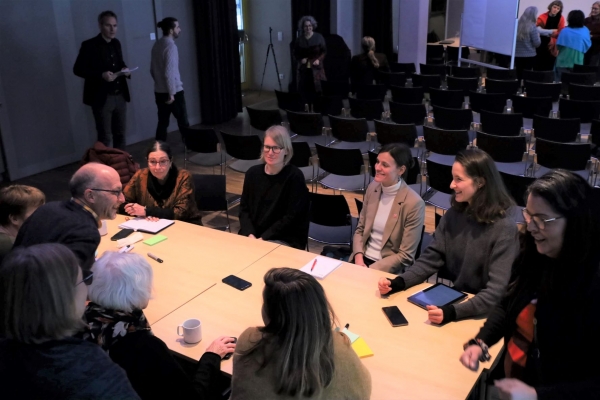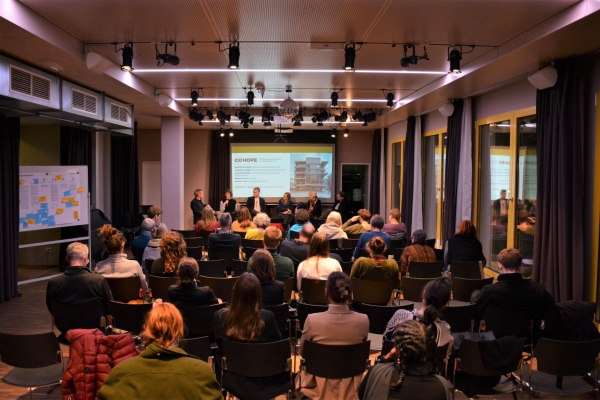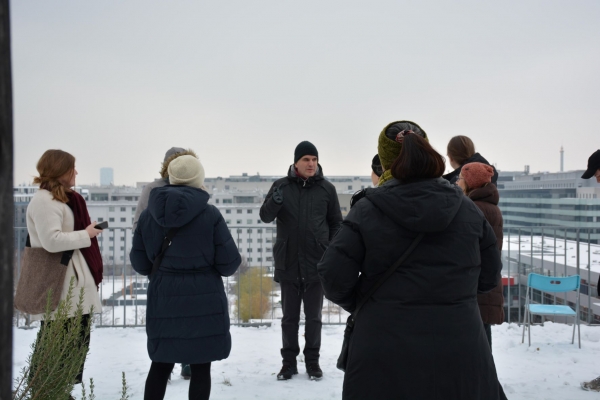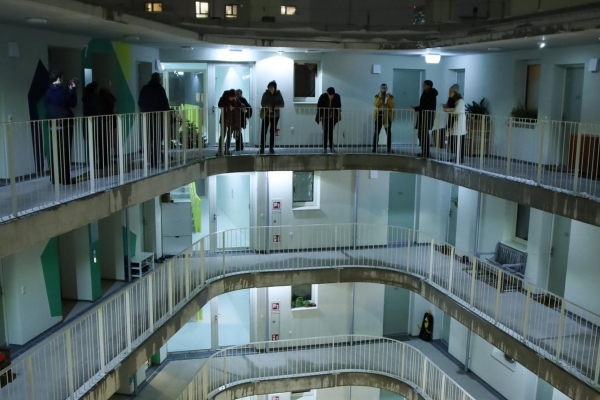Co-creative Learning from Collaborative Housing
Retrospective: Two-day CO-HOPE event “Urban Resilient Development”
The international co-housing community of CO-HOPE jointly deepens research on the nexus of health, social integration and affordability in the context of crises and gains insights into recent developments on the ground. From the 4th to the 5th of December 2023, the CO-HOPE consortium, along with cooperation partners and various actors in the field of collaborative housing, came together for a two-day event in Vienna. The event featured co-creative workshops, discussions, and visits aimed at deriving insights from collaborative housing. What can collaborative housing projects achieve with regard to housing affordability, social integration and health? To what extent do residents claim their “right to the city”, and what role do local framework conditions play in this context?
On the first day, the consortium was welcomed at Gleis 21, followed by a visit to the Kolokation Sonnwendviertel senior co-housing project located nearby. Freya Brandl, an architect, co-housing activist, and co-founder of the Kolokation Association, introduced us to the project and her efforts to promote senior co-housing in Vienna. Kolokation Sonnwendviertel is part of a larger subsidized housing project, with one floor being dedicated to the co-housing community, which provides affordable living opportunities for older adults.
In the afternoon, Robert Temel presented preliminary findings from a co-creative workshop series regarding challenges and recommendations in different development phases of collaborative housing projects. During a session with four moderated tables by the Initiative for Collaborative Housing and Living and the future.lab Research Center, these were then discussed and further developed in the context of housing affordability, social integration, health and the right to the city. The aim was to advance recommendations for collaborative housing actors.
Workshop session (photographer: Emma Lysholm © CO-HOPE, 2023)
The public panel discussion opened new perspectives on the potential and limits of collaborative housing projects. Communities of such housing types can provide a caring environment for residents of all ages. For instance, senior co-housing projects have the potential to ease the burden on institutional healthcare services and relatives. However, a main challenge remains in finding affordable land and funding sources. In this regard, the Viennese housing subsidy and co-housing selection procedure are vital framework conditions that enable collaborative housing projects. After the discussion, Michael Kerbler from Gleis 21 kindly took us on a tour of the building and answered various questions about the project.
Panel discussion with Amila Širbegović, Markus Zilker, Johanna Leutgöb, Kerstin Kärnekull, Robert Temel, moderation: Johannes Lutter (photographer: Ruth Höpler © CO-HOPE, 2023)
On the second day of the event, we continued at the co-housing project Wohnprojekt Wien located in Nordbahnviertel. Reflecting upon the table discussions of the previous day, it became apparent to what extent housing affordability, social integration and health are interconnected. For example, if the rent rates or entry costs are too high, people with lower incomes might not be able to participate. On the other hand, collaborative housing residents' sharing practices can save resources and positively impact their health in various ways. Many participants emphasised that the decisions made during the start phase have implications for further development stages of the collaborative housing project. Markus Zilker, architect and co-housing resident, showed us around Wohnprojekt Wien and provided more details about the co-housing community and the commercial spaces on the ground floor zone.
Markus Zilker showing us around Wohnprojekt Wien (photographer: Ruth Höpler © CO-HOPE, 2023)
Two further study visits followed an intense working session on how the collected data of the CO-HOPE project might result in policy recommendations. Peter Rippl, initiator of the radically mixed-use project dieHauswirtschaft, provided insights into the recently finished building in Nordbahnhof. Organised as a cooperative, the pioneers seek to intersect residential and commercial uses. While the first three floors are mainly reserved for commercial uses, the upper floors provide space for private apartments, guest apartments and common spaces. Moreover, the commercial zone also provides hybrid spaces for residents and people working there.
Visit of dieHauswirtschaft with Peter Rippl (photographer: Ruth Höpler © CO-HOPE, 2023)
In the evening, we were shown around Wohnprojekt Kohlenrutsche, a co-housing building featuring multiple shared spaces on the ground floor and rooftop. The collaborative housing project includes a dedicated housing unit for a community of students and individuals with intellectual disabilities who share a flat.
This event emphasised the significance of interdisciplinary and transdisciplinary learning and international knowledge exchange between collaborative housing actors. It brought together experts from Austria, Sweden, France, and other countries to share ideas over two days. All attendees agreed that building strong communities is crucial to overcoming future crises.
The event was organised by Robert Temel and Urban Innovation Vienna as part of the CO-HOPE project.
Header: Workshop session (photographer: Ruth Höpler © CO-HOPE, 2023)




